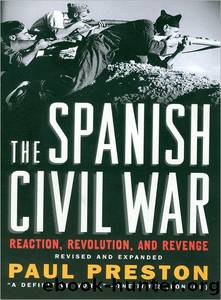The Spanish Civil War: Reaction, Revolution, and Revenge (Revised and Expanded Edition) by Paul Preston

Author:Paul Preston [Preston, Paul]
Language: eng
Format: epub
Tags: Europe, Spain & Portugal, History
ISBN: 9780393345827
Google: 03rWfa5-GGkC
Publisher: W. W. Norton
Published: 2007-06-17T21:29:18+00:00
SEVEN
Politics behind the Lines: Reaction and Terror in the City of God
If Stalin was cautious in helping the Spanish Republic, Hitler and Mussolini were by comparison unstinting in their aid to Franco. Stalinâs attitude was summed up in his admonition to the high-ranking Soviet advisers sent to Spain: âStay out of range of artillery fire.â However, just as important as the scale and enthusiasm of foreign assistance were to be the strings attached to it. Every bit as much as the Soviet Union, the Fascist powers sought the right to intervene in Spanish internal affairs as an additional levy on their aid. It was not just a question of German officers arrogantly demanding the best rooms in hotels, to be served first in restaurants or that other diners stand for the singing of the Nazi anthem, the âHorst Wessel Songâ, nor of swaggering Italian officers making love to Spanish girls. Francoâs pleas for help had been couched in terms that seemed to promise that, if victorious, his Spain would be a satellite of the Fascist powers. In the event, Franco would resist Mussoliniâs attempts to inject urgency and Italian direction into his lumbering military strategy but he would concede very considerable mineral resources and mining rights to the Germans.
Nevertheless, Axis help brought fewer complications than did Russian assistance to the Republic. The manner in which dependence on Soviet aid was manipulated to inflate the influence of the Spanish Communist Party exacerbated the Republicâs greatest weakness, the interminable, and violent, polemics between its various factions as to how the war should be fought. The trappings and symbols of the Falange provided the necessary veneer of international Fascist solidarity. There were individual attempts to boost the Falange. Hitlerâs first envoy, General Wilhelm Faupel, meddled inconsequentially in support of the more pro-Nazi elements of the Falange. In March 1937, Mussolini sent Roberto Farinacci, the powerful Fascist boss of Cremona, to persuade Franco to introduce a Fascist-style âSpanish National Partyâ to impose total control of political life. Both were politely ignored. Moreover, the German and Italian regular army officers in Spain tended to sympathize much more with the traditional values of their Spanish brothers-in-arms than with the anti-oligarchical rhetoric of Falangism. Thus, in the competition for power in the Nationalist zone, the Falange was not boosted by the Germans and Italians in the way that the Communist Party was elevated to a hegemonic position by the committed backing of the Russians. In consequence, the Nationalists enjoyed a dramatically higher level of unity behind their lines than did the Republicans.
This unity derived largely from the preeminence of the military. Virtually all other questions were relegated while the soldiers got on with the job of winning the war. Thus, despite the existence during the Second Republic of competing rightist political groups â the CEDA, Falangists, Carlists and Alfonsine monarchists â a moratorium was effectively placed on political activity once the war broke out. This was not especially difficult given the level of cooperation between them that had existed before 1936.
Download
This site does not store any files on its server. We only index and link to content provided by other sites. Please contact the content providers to delete copyright contents if any and email us, we'll remove relevant links or contents immediately.
| Africa | Americas |
| Arctic & Antarctica | Asia |
| Australia & Oceania | Europe |
| Middle East | Russia |
| United States | World |
| Ancient Civilizations | Military |
| Historical Study & Educational Resources |
Magic and Divination in Early Islam by Emilie Savage-Smith;(1531)
Papillon by Henry Charrière(1420)
Bohemians, Bootleggers, Flappers, and Swells: The Best of Early Vanity Fair by Bohemians Bootleggers Flappers & Swells- The Best of Early Vanity Fair (epub)(1394)
Ambition and Desire: The Dangerous Life of Josephine Bonaparte by Kate Williams(1383)
Twelve Caesars by Mary Beard(1311)
Operation Vengeance: The Astonishing Aerial Ambush That Changed World War II by Dan Hampton(1155)
What Really Happened: The Death of Hitler by Robert J. Hutchinson(1154)
London in the Twentieth Century by Jerry White(1142)
The Japanese by Christopher Harding(1129)
Time of the Magicians by Wolfram Eilenberger(1125)
Twilight of the Gods by Ian W. Toll(1112)
Lenin: A Biography by Robert Service(1072)
The Devil You Know by Charles M. Blow(1022)
A Social History of the Media by Peter Burke & Peter Burke(966)
Freemasons for Dummies by Hodapp Christopher;(962)
Napolean Hill Collection by Napoleon Hill(936)
Henry III by David Carpenter;(919)
The Churchill Complex by Ian Buruma(906)
The Rise and Triumph of the Modern Self by Unknown(904)
